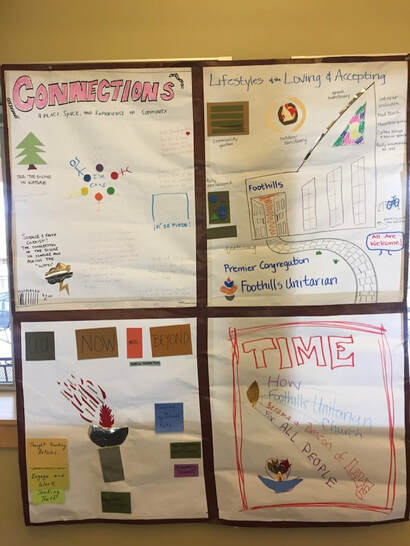|
from Laura Park, Managing Director We’ve written extensively about how to write ends in conversation with the congregation and other sources of the board’s authority and accountability. But what happens after the board has set the vision for what will change in people’s lives over the next five to seven years of the congregation’s ministry?
One question that comes up regularly is how to respond to ambitious ends that give very little specific direction for programs and ministries. As one minister said to me, “We could drive a truck through our ends they’re so broad and open.” If you’re accountable for results on such ends, what do you do? Five suggestions: Celebrate your opportunity. Your board trusts you to appropriately interpret its vision. The board wants your vision to influence and shape how the congregation develops and deepens. Use this opportunity to clarify for yourself, for the board, and for the congregation as a whole what it will mean to make progress together on your ends (see “Write an interpretation” below). How they respond will inform everyone about what’s truly possible for your ministry together. Take a second look. Are the ends really as broad as you think they are? Where are they inviting you to challenge the congregation, comfort the congregation, keep the status quo, invite change? Invite the congregation to consider what the ends are asking of them. This works particularly well in small groups. How would they know their group’s ministry is changing lives in the way the ends identify? How might their group’s work advance the ends? Look to the future. Most congregations re-write ends every five years. How might you help the congregation clarify and deepen their understanding of their ministry so that the next set of ends are more focused? Make it formal: write an interpretation. You want to do this for all ends, because it answers two key questions for the board:
Want more help? We're convening study groups on writing interpretations in the fall; more information here. Or contact us to arrange for one-on-one coaching.
1 Comment
from Laura Park, Managing Director  I was recently in Colorado working with Foothills Unitarian Church, a vibrant, growing congregation with an engaged and thoughtful board. They had completed the congregational conversation process about values and mission outlined in my book The Nested Bowls: The Promise and Practice of Good Governance. One of the exercises in that process asks small groups of congregants to consider what difference they want their congregation to make in people’s lives in the future. These small groups have already discovered their congregation’s strengths and shared their individual wishes for their congregation’s future. This exercise asks them to imagine what might change in people’s lives if the congregation used its strengths to make two or three of the wishes that they all want together to come true. Participants create a magazine cover (or a website landing page!) talking about their future congregation and how it is changing lives.  The magazine covers people create in this exercise are often very powerful, filled with images that are aspirational and yet grounded in the strengths of the congregation as it is. The Foothills board took the images their participants created and made beautiful quilts from them, quilts that they hung around the church to share what congregants saw as possible for the future. The board immersed themselves in these images and used what they learned from them to write ends statements describing what difference the church will make in people’s lives. These ends statements will guide everything the congregation does in the next five years, and the board will be engaged in determining what progress is being made on making the ends statements real. Discover how you can discern and articulate the relevant, meaningful ways your congregation is meant to change lives. Visit the Nested Bowls page or the Casting the Vision page on our website, or check out The Nested Bowls book, available as a paperback or an e-book from Amazon.
Alignment and focus. Clarity and commitment. These are just a few of the benefits congregations can realize from a succinct and powerful mission, particularly when established within an effective governance system. Effective governance makes it clear who articulates the mission (the board), what the mission needs to articulate (what's our transcendent purpose-what overarching difference are we here in the world to create and for whom?), and how the means for achieving the mission will be established (through the minister or executive team).
Effective governance also raises the powerful question, "Whose are we?" Who are our sources of authority and accountability-on whose behalf do we do this work? Is it just our members, or do we draw our authority from and experience our accountability to a broader set of sources? How can we get and stay in contact with these sources as we do this work? Who else needs to inform our articulation in order to do our best work on their behalf? Despite the clarity effective governance brings, developing a mission isn't easy. How can you have an inspiring and powerful congregational conversation to inform your mission development? How can you take all your congregational input and then say, simply and beautifully, what difference you're in the world to create and for whom? How can you create the powerful alignment that an effective mission can bring to all your congregation's work? Unity Consulting has worked with several congregations to design powerful congregational processes to inform their mission articulation, and then worked with them on the questions of "Whose are we?" and mission. In the words of one of our clients, "The appreciative inquiry process, which you and your colleagues at Unity Consulting have adapted so skillfully for use in churches, was the perfect way for us to approach the renewal of our mission and ends. The positive nature of the process and its focus on the future were just what was needed. Yesterday's retreat proved that what we had learned from the AI workshops really could be distilled into succinct and powerful values, mission, and ends. And it really did have some "magic" in it!" Please contact us if you'd like to explore how we might help you tap into the power of mission! |
What's Here?Our thinking about the role of governance in congregational life. Archives
April 2020
Categories
All
|
© Unity Consulting • A program of Unity Church-Unitarian • Awaken compassion. Transform lives. Bless the world.
732 Holly Avenue, Saint Paul, MN 55104 • 651-228-1456 • [email protected]
732 Holly Avenue, Saint Paul, MN 55104 • 651-228-1456 • [email protected]


 RSS Feed
RSS Feed
